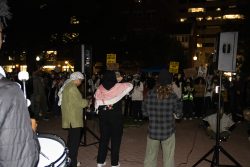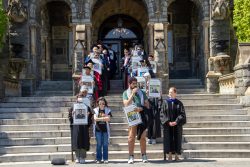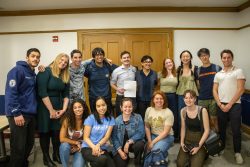Tuesday began just like any other day. Students went to their 8:50 a.m. classes and business at Georgetown seemed to run as usual. Little did we know that in a matter of minutes, our entire concept of so-called U.S. security would be drastically overturned.
Walking around Tuesday mid-afternoon, there was a disturbingly calm atmosphere on campus. Instead of the hustle and bustle of the normal school day, there was an ironic air of somberness on the beautiful September day.
Though the atmosphere was tranquil on campus, in reality, a significant amount of work was being done by University administrators behind the scenes. By mid-morning, classes had been cancelled and a slew of University-wide e-mails flooded students’ mailboxes. An interfaith prayer service was organized to give students a way to seek some sort of peace. Administrators addressed students early in the afternoon, alerting them of measures being taken by the University. Counseling services were made available. Students were summoned to man phone lines to respond to calls from anxious parents.
All vehicles without University identification were prohibited from entering campus. The Department of Public Safety conducted sweeps of all major campus building and trash cans for any suspicious materials. Student guards were also notified to take more precaution when checking identification of all individuals entering buildings.
Despite the fact that no harm had been inflicted within the actual boundaries of the District of Columbia, it is admirable that the University took such significant measures in handling Tuesday’s situation. First and foremost, by cancelling classes, University President John J. DeGioia demonstrated that he understood students’ needs to deal with the horrors of the day without having to worry about classes and schoolwork. Through such measures, students could again feel a certain degree of security that they had been robbed of earlier that morning.
Though the aftermath of Tuesday’s occurrences will continue for a long time, it is doubtful that Georgetown life will be visibly affected. Students and faculty will not forget the horrors that have occurred, but it is likely that business will return to as usual in the coming days. Whether or not this continuation of the regular Georgetown routine is the best method of dealing with the situation, however, is still unclear.
Perhaps if the University were shut down for longer or if more classes were cancelled, this would ultimately be a negative service to students ?allowing them to dwell more on the situation than is healthy. On the other hand, as a note to professors would be wary of students who are reacting to the situation more seriously than others. Do not expect all homework assignments to be completed on time or for coursework to be completed at the highest standards in the next few days. Professors must take into account the difficulty of concentrating on schoolwork during such a tragic time. There is no need to send e-mails reminding students of their assignments and declaring that work is expected to be turned in on time, as some professors have already done. Life will return to normal for Georgetown soon enough, so in the meantime, faculty should follow the examples of their administrator colleagues and remember that students’ well-being should always be the first priority.




